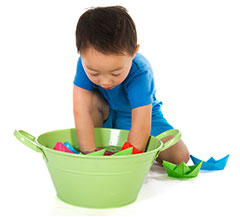Science
 From the moment they are born, children share many of the characteristics of young scientists. They are curious and persistent explorers who use their senses to investigate, observe, and make sense of the world around them.
From the moment they are born, children share many of the characteristics of young scientists. They are curious and persistent explorers who use their senses to investigate, observe, and make sense of the world around them.
As they grow and develop, they become increasingly adept at using the practices that scientists use to learn about the world—including asking questions, planning, and carrying out investigations, collecting and analyzing data, and constructing explanations based on evidence. Like young engineers, they also become increasingly skilled at identifying and addressing problems that arise in their play and designing and testing solutions, especially in their constructive play with objects and materials. The RIELDS science domain includes a standard focused on the science and engineering practices as well as standards that address children’s learning of basic concepts in physical, Earth/space and life science. Children deepen their understanding of these concepts gradually over time and many experiences. Crosscutting concepts, including cause and effect, patterns, and structure and function (e.g., how something is made relates to how it is used) are also incorporated and embedded within each standard. Engaging in the science and engineering practices in the service of building their understanding of science concepts creates many opportunities for children to develop mathematics knowledge and abilities as well as skills in the physical, language, literacy, cognitive, and social-emotional domains including essential, but less readily observable executive function skills such as working memory, attention to tasks, and cognitive flexibility.
All children come to a school or community-based setting with a variety of prior experiences in science can take part in and learn science. In relation to the standards, each child will express their development and learning in different ways, at different times, and at different paces. Children with disabilities may demonstrate alternate ways of meeting the goals of the science domain. For example, a child with a cognitive delay may require additional hands-on-learning opportunities to generalize science content and a child with an expressive language delay may require pictures or photographs to contribute observations and predictions after classroom-based investigations. Children with disabilities may reach many of these same goals, but at a different pace, with a different degree of accomplishment, and in a different order than their peers. However, the goals for all children are the same, even though the path and the pace toward realizing the goals may be different. Principles of universal design for learning (UDL) offer the least restrictive and most inclusive approach to developing environments, adopting curricula, and facilitating children’s experiences in ways that best support science learning for all children.
Remember:
The practices of science incorporate a wide range of skills across the domains of development and learning. For example, the practices include multiple opportunities for children to engage in productive talk and exercise language and literacy skills as they formulate questions, explore and describe observable phenomena, record findings, and discuss their emerging ideas with others. As you plan science experiences it will be important to think broadly about children’s levels of development and learning and consider their day-to-day family, home, and community experiences so that you implement and facilitate science experiences that are meaningful and responsive to children’s lives, interests, cultural and linguistic backgrounds, and leverage their strengths, and support areas for growth in context.
